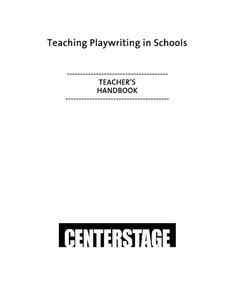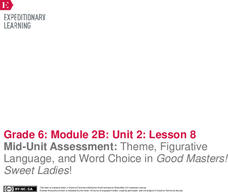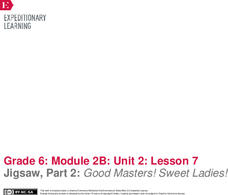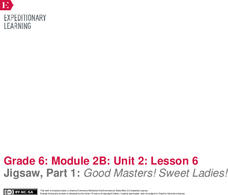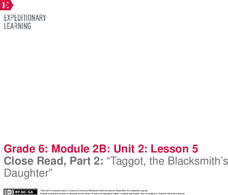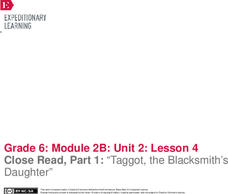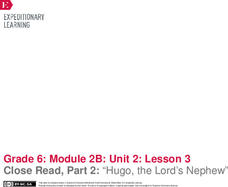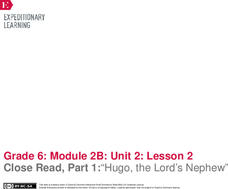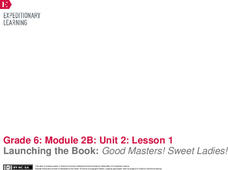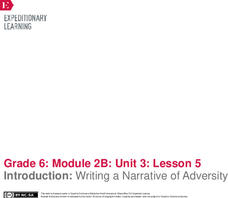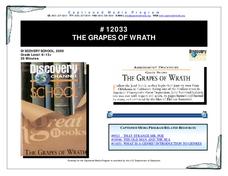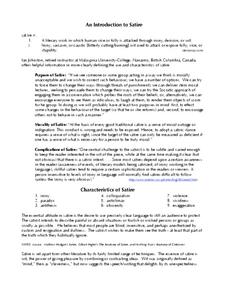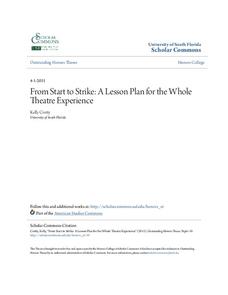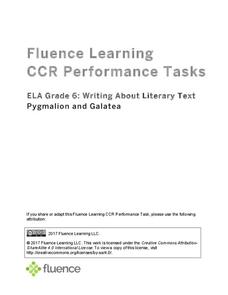Learning to Give
Teaching Playwriting in Schools
The world is a stage, and so is your classroom! Hone the skills of the next generation of Tony® award winners with a set of exercises, reference pages, writing prompts, and excerpts from famous plays.
K20 LEARN
What Do You Want To Talk About? Writing Dialogue
Pictures really do talk in a instructional activity that teaches young writers how to craft dialogues. Class members closely examine Grant Wood's American Gothic, imagine what the couple might think or feel, and put these words to paper,...
National Endowment for the Humanities
Dramatic Perspective in Moby Dick
A lesson on Herman Melville's Moby Dick asks readers to compare the first person point of view of Ishmael in Chapter 1 to Captain Ahab's dramatic monologue in Chapter 37. Readers cite evidence from the chapters to support their analysis...
EngageNY
Mid-Unit Assessment: Theme, Figurative Language, and Word Choice in Good Masters! Sweet Ladies!
Time to show what you know. Scholars complete a mid-unit assessment to demonstrate their learning from the past lessons. Learners work independently to identify the theme and answer questions about Pask, the Runaway. They also examine...
EngageNY
Jigsaw, Part 2: Good Masters! Sweet Ladies!
Three heads are better than one. Scholars gather back in their triads for another read of their monologues. They answer text-dependent questions and review their work. Learners then present their jigsaw monologues to the rest of the class.
EngageNY
Jigsaw, Part 1: Good Masters! Sweet Ladies!
Complete a puzzle one piece at a time. Scholars gather in triads to complete jigsaw activities over a monologue from Good Masters! Sweet Ladies. They read as a group and independently and use sticky notes to identify the gist of each...
EngageNY
Close Read, Part 2: “Taggot, the Blacksmith’s Daughter”
It is just a figure of speech. Readers look for figurative language as they read Taggot, the Blacksmith’s Daughter. They complete a Figurative Language graphic organizer by recording and identifying the types of figurative language found...
EngageNY
Close Read, Part 1: “Taggot, the Blacksmith’s Daughter”
There would be no luck if it were not for bad luck. Scholars take a close look at the theme of adversity through multiple reads of Taggot, the Blacksmith’s Daughter. They place sticky notes on important details of the story and complete...
EngageNY
Close Read, Part 2: “Hugo, the Lord’s Nephew”
No, not literally. Scholars read Hugo, the Lord’s Nephew to compare figurative and literal language. Readers learn about simile, metaphor, personification, and idioms with a graphic organizer. Pupils then answer text-dependent questions...
EngageNY
Close Read, Part 1: “Hugo, the Lord’s Nephew”
Fourth time is a charm. Learners complete multiple reads of Hugo, the Lord’s Nephew. On the fourth read, they make notes about each page on sticky notes. They then complete a think-pair-share activity with a partner to determine the...
EngageNY
Launching the Book: Good Master! Sweet Ladies!
Every person has a different story to tell. Scholars take a quick look at the book Good Masters! Sweet Ladies! Voices from a Medieval Village. They discover that each character tells a different story. They then look at one...
EngageNY
End of Unit Assessment, Part 2: Drafting Introduction and Conclusion of a Narrative
First and last impressions matter. Scholars compose the introductory and concluding sections of their narrative writing assignments. Also, to prepare for an upcoming performance task, pupils watch a modern-day monologue from the movie...
EngageNY
Introduction: Writing a Narrative of Adversity
A little adversity is good for writing. Scholars review narrative-based monologues and concrete poems and choose which genre to use to express their own theme of adversity. Pupils also consider how to structure their narratives by...
Literacy Design Collaborative
Analyzing Language through Dialogue and Internal Monologue in "The Scarlet Ibis"
James Hurst's short story "The Scarlet Ibis" provides eighth graders with an opportunity to sharpen their literary analysis skills. After a close reading of the text, class members highlight and annotate parts of the dialogue and...
Captioned Media
Creating Dramatic Monologues from The Grapes of Wrath
Set in Oklahoma in the 1930s, The Grapes of Wrath presents a powerful view of life during the Great Depression. An insightful lesson plan takes a closer look at the characters in John Steinbeck's classic novel, combining the descriptions...
Jackson School District
An Introduction to Satire
What is satire, and what are its characteristics? A handy handout provides young satirists with all the information they need to analyze a satire or to craft their own.
Honors College at Scholar Commons
From Start to Strike: A Lesson Plan for the Whole Theatre Experience
Introduce young thespians to all aspects of the theater. A syllabus for a one-semester drama course provides lessons that take learners from the history of drama to the many facets of play production.
Folger Shakespeare Library
Essential Everyday Bravery
Shakespeare's plays may be old, but they still have relevant lessons for today's world! A collection of lesson plans uses examples from The Merchant of Venice and District Merchants to teach about bravery. In addition to learning...
Fluence Learning
Writing About Literary Text: Pygmalion and Galatea
Is it crazy to fall in love with your own work, or is that the purest love of all? Compare two renditions of the classic Greek myth Pygmalion and Galatea with a literary analysis exercise. After students compare the similarities and...
Poetry Class
Writing a Monologue
The works of Carol Ann Duffy, Scottish poet and Britain's 2009 poet laureate, serve as a model for a writing activity that asks class members to select a character card, brainstorm lists of words, phrases, actions, and items associated...
Curated OER
"One-Minute Monologue" Builds Communication Skills
Get everyone talking! It's rare that a lesson plan can potentially span from third to twelfth grade, but this one really can! Get two paper bags. Fill one with the names of each learner, and fill the other with random topics you...
Curated OER
The Legend of King Arthur
Students explore historical perspectives through literature. In this King Arthur activity, students discover the attributes of dramatic monologue as they read selected literature. Students then discuss the legend of King Arthur and...
Curated OER
Historical Figure: A Monologue
Fourth graders develop their speaking skills. In this monologue lesson, 4th graders watch their instructors model a monologue regarding Abraham Lincoln. Students apply these skills as they research a historical figure from their state...
Curated OER
Creating Dramatic Monologues from The Grapes of Wrath
The characters in The Grapes of Wrath come to life through an activity that asks groups to craft a dramatic monologue for a character in John Steinbeck's National Book Award and Pulitzer Prize winning novel. Writers are challenged to...


